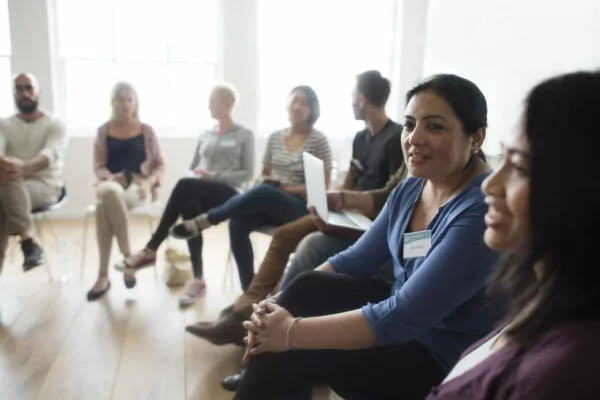What is Mindfulness?
Mindfulness has been around for thousands of years in various religious and secular traditions, such as Hinduism, Buddhism, yoga, and other non-religious meditations.
It is generally thought that mindfulness moved from the East to the West, from religious traditions to more secular practices, with one of the biggest contributors to this move being Jon Kabat-Zinn.
Kabat-Zinn founded the Center for Mindfulness at the University of Massachusetts Medical School (in 1979) and the Oasis Institute for Mindfulness-Based Professional Education and Training (in 1995). He then developed his 8-week Mindfulness-Based Stress Reduction (MBSR) program.
The spread of mindfulness into the Western world relied partially on Kabat-Zinn’s ability to mix the Eastern traditions with Western science. His MBSR program served as an inspiration for another mindfulness-based therapy; Mindfulness-Based Cognitive Therapy (MBCT) which is aimed at treating Major Depressive Disorder.
Mindfulness is essentially maintaining a moment-by-moment awareness of our thoughts, feelings, bodily sensations, and surrounding environment, through a gentle and nurturing lens.
We do not necessarily need to be sitting on the floor with our legs crossed or even meditating at all in order to practice mindfulness.
Mindfulness as a way to cope
Practicing mindfulness has been found to be beneficial not only to our immune systems (Davidson et al., 2003) and our sleep (Hülsheger et al., 2015), but also to our minds.
Several studies have shown that practicing mindfulness increases positive emotions while decreasing negative emotions (Keng et al., 2011). Practicing mindfulness allows us to identify our emotions while they are happening and allows us the time that we need to separate our emotions from what is happening around us, from what is triggering our emotions. This helps us to take a step back rather than snapping at someone when we are feeling angry or upset.
Part of mindfulness practice is to notice the emotions and thoughts that arise in us, without judgement, and without trying to change them. We just notice our thoughts and feelings and allow them to pass through.
We don’t think about the day that we just had at work or the awkward conversation we are anticipating later on – and if we do find ourselves thinking about these things, we don’t tell ourselves off or get frustrated, we simply let it go, with the knowledge that we can deal with that later.
This practice can seep into our everyday life, so that rather than having to carve out time and space to sit and practice mindfulness, we find ourselves doing this more naturally. For example, you might be receiving a deluge of emails at work and your partner is sending you text after text about dinner plans for that night and you can hear your co-worker chatting away on the phone – you feel like your mind is about to explode.
Instead, you just breathe. Take a step back and take that moment to re-centre yourself and separate yourself from what is happening around you.
What are you feeling right now? No judgement, just notice. Are you feeling anxious? Are you feeling angry? Are you feeling overwhelmed? It’s okay to feel these things, you are in a stressful situation and anyone would have the same reaction as you. Breathe. Then re-enter your day.
Perhaps you give your partner a quick phone call to answer all of their texts and let them know that you have a lot going on right now but you will get back to them later (or maybe you send that in a text). Maybe you put some headphones on to silence your co-worker’s distracting conversation.
How to bring mindfulness into your everyday life
Above is just one example of how to bring mindfulness into your everyday life, and it shows how mindfulness can help in a stressful situation, but it doesn’t always have to be stressful situations, you can use mindfulness in almost any situation just to give yourself a bit of grounding and breathing space. Below are a few examples that you can incorporate in simple ways;
- When you are in the shower, take a moment to just stand under the stream of water and feel the temperature of it. Feel the way the water hits your shoulders. Just breathe.
- When you are sitting on the bus, plant your feet flat on the floor and roll them from your heels to your toes, feel the floor beneath your feet, feel the bus rumble as it moves along the street. Feel the seat beneath you, supporting your weight, against your back. Just breathe.
- When you are driving, feel the steering while in your hands, squeeze it and then loosen your grip, feel the seat as it supports your weight, your feel as they balance on the pedals. Just breathe.
- When you get into bed at night, or when you wake up in the morning, do a body scan. Start at your toes, feel as they wiggle and you roll your ankles. Move your awareness up your calves, over your knees, up your thighs and over your hips and stomach, up to your chest, feel your chest rise and fall as you breathe, move up to your shoulders, down your arms, feel your fingers wiggle. Back up to your neck, your chin, cheeks, ears, eyes, and finally to the roots of your hair on your scalp. Do you feel tightness anywhere? Do you feel stiffness in your shoulders? Are you clenching your jaw? Just breathe.
If you would like to learn more about how mindfulness can help you, we have a team of counsellors and therapists who will be able to help. For more information, call 020 8673 4545 or email [email protected] to book your first appointment. We have sessions available seven days a week at our Clapham and Tooting centres.








